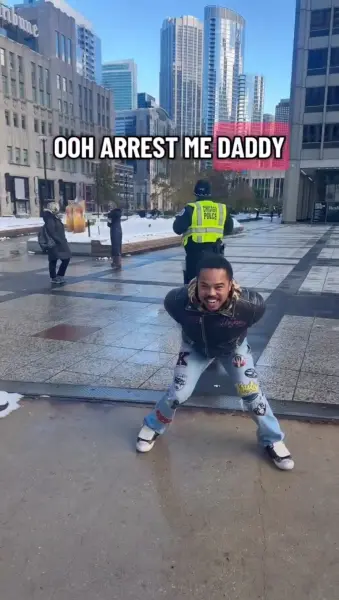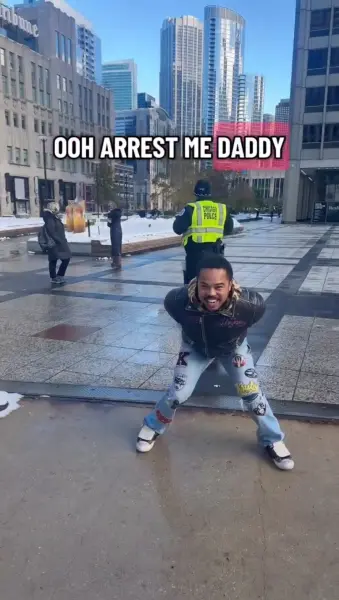Chicago Rapper and Social-Media Star Adamn Killa Arrested After Viral “Arrest Me, Daddy” Stunt Goes Too Far
A viral stunt that began as lighthearted trolling of law enforcement has now ended with real consequences. Chicago-based rapper and influencer Adam Kelly, better known as Adamn Killa, was detained this week after one of his infamous public pranks crossed a line. The 29-year-old performer, who rose to fame online by running up to police officers and taunting them with the phrase “Arrest me, Daddy,” was finally arrested by a fed-up Chicago officer during a filmed stunt downtown.

The arrest happened earlier this week in the city’s Loop area near East Randolph Street, according to footage shared across TikTok and Instagram. In the now-viral clip, Killa can be seen approaching a Chicago police officer as the officer was managing a traffic stop. Laughing into his phone’s camera, Killa struck a pose, turned around, and shouted his trademark line: “Arrest me, Daddy!” Within moments, another officer stepped in, handcuffed him, and escorted him to a nearby squad car as bystanders recorded the entire scene.
Witnesses say the influencer appeared unfazed, even amused, as the officer led him away. “He was smiling the whole time,” said one passerby who captured part of the moment on video. “It’s like he wanted it to happen.” That perception wasn’t wrong — within hours of his release, Killa was back on Instagram, posting the footage with the caption: “They listened.” The post quickly went viral, accumulating hundreds of thousands of views within minutes and igniting a debate online about the limits of influencer stunts in public spaces.
Police confirmed the brief detention but said Killa was released without formal charges. The department’s report listed the stop as an “investigatory detention,” noting that while Killa’s behavior was disruptive, no criminal complaint was filed. According to a spokesperson for the Chicago Police Department, officers exercised discretion in handling the incident and prioritized de-escalation.

For months leading up to the arrest, Adamn Killa had built a social media empire around his bizarre brand of performance — blending satire, provocation, and street culture. His videos, which often feature him dancing or yelling in front of uniformed officers, amassed millions of views on TikTok and Instagram. To some, the “Arrest me, Daddy” trend was harmless comedy — a viral gag poking fun at authority. To others, it was reckless, even dangerous.
Killa himself has described the act as “social commentary.” In an interview with the Chicago Sun-Times earlier this week, he claimed that his antics were meant to draw attention to how police respond to civilians under stress. “It’s about showing how they react,” he said. “I never disrespect them — I’m just playing a role. I’m showing how humor can disarm tension.”
Still, police officials and local residents have voiced growing frustration. They argue that such stunts can interfere with real law enforcement duties and potentially create unsafe situations. Traffic stops and public interactions with police are already high-risk scenarios — adding viral theatrics only complicates matters. “It’s not funny when someone distracts officers during a live stop,” one Chicago police representative told The Post. “You’re risking everyone’s safety for a few clicks.”
Despite the pushback, Killa has shown no signs of backing down. After his release, he posted another video the very same day, walking up to a different pair of officers while declaring, “Round two, Daddy!” The clip, captioned “Still undefeated,” was met with mixed reactions — some calling it fearless, others labeling it foolish.
Beyond the controversy, the moment also raises questions about the evolving culture of social media celebrity — where the line between entertainment, activism, and provocation is increasingly blurred. Influencers like Killa thrive on virality, and attention, positive or negative, fuels the algorithm. The more outrageous the stunt, the greater the exposure — and the stronger the incentive to push boundaries.
Killa’s rise to online fame reflects that dynamic. A once-obscure rapper from Chicago’s South Side, he first gained attention for his experimental trap music and collaborations with underground artists. When his music struggled to break through mainstream charts, he shifted his focus to social media, where his eccentric humor and unpredictability quickly found an audience. The “Arrest me, Daddy” bit — first filmed in 2023 as a one-off joke — turned into a full-fledged persona. By mid-2024, it had become his trademark and a viral catchphrase across TikTok and Twitter.
Yet, as his fame grew, so did the criticism. Law enforcement experts and social media analysts have called such content “provocative performance art disguised as comedy.” Dr. Megan Ortiz, a communications professor at Northwestern University, says that while Killa’s behavior may be framed as satire, it ultimately feeds into a cycle of risk. “The influencer economy rewards spectacle,” Ortiz explained. “If you’re an artist competing for attention, you eventually learn that outrage equals engagement. It’s not always malicious — but it’s undeniably manipulative.”
Killa’s recent arrest could be a turning point, though he doesn’t seem to view it as one. “Getting cuffed just proves the point,” he told followers during an Instagram Live after his release. “They finally gave the people what they wanted.” His defiance has only amplified his popularity — within 24 hours, his follower count increased by over 50,000, and major outlets picked up the story.
For Chicago officials, the incident represents a larger issue — the tension between freedom of expression and public order. While the influencer technically broke no law, his repeated interruptions of active police duties test the limits of civil conduct. The Chicago Police Department has reportedly reviewed his videos to determine whether additional actions might be warranted if similar incidents continue.
The cultural impact of such viral acts also underscores how digital fame can normalize disruptive behavior. In an age where entertainment is measured by views rather than values, individuals like Killa blur the line between art, activism, and attention-seeking. Social media feeds off controversy — and controversy, for influencers, becomes currency.
Still, there’s an irony to Killa’s situation. The very phrase that made him famous — “Arrest me, Daddy” — has now become literal. The video of his actual arrest, posted and reshared across platforms, captures both the absurdity and consequence of online culture colliding with real-world boundaries. One clip shows him laughing as officers place him in handcuffs; another shows him smiling through the car window as fans cheer from the sidewalk.
Even as his critics argue that he’s trivializing law enforcement, Killa insists he’s just performing. “It’s performance art,” he said in one of his TikTok videos. “The world’s already crazy — I’m just making people laugh about it.” Whether audiences find it funny or frustrating, the stunt continues to spark debate about personal freedom, the responsibilities of creators, and the price of digital fame.
For now, Adamn Killa is back online, back to posting, and back to his trademark antics. Chicago police say they will “monitor future behavior,” but with no charges filed, the influencer remains free to continue his act — a living example of the strange intersection between humor, rebellion, and reality in the social media age.
As one commenter succinctly wrote under his latest post: “He asked for it… and they finally delivered.”


